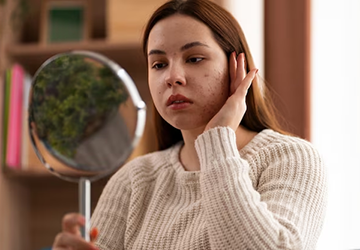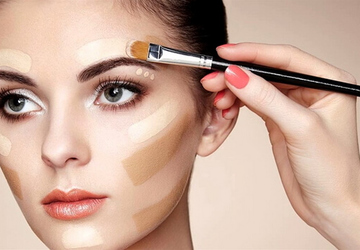beauty
The relationship between stress and skin health is a complex and significant one. Stress, particularly chronic stress, can profoundly impact the skin, the body's largest organ. When we experience stress, our body releases stress hormones like cortisol, which can disrupt the delicate balance of our skin. This hormonal fluctuation can lead to various stress-related skin problems, such as acne breakouts, eczema flare-ups, psoriasis, and even premature ageing. Because skin is susceptible to emotional and environmental stress, often reflecting internal imbalances, managing stress is critical to keeping skin healthy.

Identifying Stress-Related Skin Problems
Stress-related skin problems can manifest in multiple ways. Common issues include increased acne breakouts, which are linked to the overproduction of oil triggered by stress hormones. Stress can also exacerbate conditions like eczema and rosacea, causing increased redness, irritation, and dryness. Additionally, chronic stress can impair the skin's barrier function, leading to dehydration, sensitivity, and a reduced ability to heal from injuries. Understanding these manifestations is critical to addressing the root cause and mitigating the effects of stress on the skin.
How to Manage Stress for Better Skin
Adopting a holistic approach is essential When managing stress for better skin. Effective stress management often involves lifestyle changes, relaxation techniques, and sometimes professional help. Regular physical activity, adequate sleep, and a balanced diet are critical in reducing stress levels. Mindfulness practices like meditation, yoga, and deep breathing exercises can also be beneficial in managing stress. Additionally, making time for hobbies and activities that bring joy and relaxation can significantly lower stress and improve skin health.
The Role of Skincare in Combating Stress-Induced Skin Issues
Adopting a tailored skincare routine alongside lifestyle adjustments is crucial in combating stress-related skin problems; this may involve using gentle, hydrating products to support the skin's barrier, avoiding harsh skincare ingredients that can aggravate stressed skin, and incorporating soothing ingredients like aloe vera and chamomile. It's also important to be mindful of skincare habits during stressful periods, as stress can sometimes lead to neglecting skincare routines or engaging in harmful habits like skin picking or over-exfoliating.
Seeking Professional Help for Stress Management and Skin Care
In some cases, managing stress and skin health may require professional help. Dermatologists can offer targeted treatments and advice for stress-induced skin issues, while therapists or counsellors can provide strategies for long-term stress management. For chronic or severe skin conditions exacerbated by stress, dermatological treatment and psychological support may be the most effective approach.
Understanding the Biochemical Processes of Stress Impacting Skin Health
The relationship between stress and skin health involves intricate biochemical processes in the body. The body's fight-or-flight response is activated when stressed, increasing stress hormones like cortisol and adrenaline. These hormones can disrupt the normal functioning of various bodily systems, including the skin. Cortisol, for instance, can cause an increase in oil production in the skin's sebaceous glands, leading to acne. Moreover, stress can lead to inflammation, exacerbating skin conditions like eczema and psoriasis. Understanding these biochemical reactions is crucial in developing effective strategies to mitigate stress-related skin problems.
Exploring the Psychological Aspects of Stress and Skin Disorders
In exploring how to manage stress for better skin, it's essential to consider the psychological aspects of skin disorders. Stress and anxiety can often lead to habits that negatively impact skin health, such as skin picking, scratching, and neglecting skincare routines. These behaviours can exacerbate skin issues, creating a vicious cycle of stress and skin problems. Addressing these psychological factors is critical to managing stress and skin health. Cognitive-behavioral therapy (CBT) and other stress-reduction therapies can effectively break these patterns and promote healthier skin.

Natural Remedies and Supplements for Stress-Induced Skin Issues
In addition to lifestyle and skincare changes, natural remedies and supplements can play a role in addressing stress-related skin problems. For example, supplements like omega-3 fatty acids, probiotics, and vitamins A, C, and E have been shown to have skin benefits and may help reduce the impact of stress on the skin. Herbal remedies, such as adaptogenic herbs like ashwagandha and Rhodiola, can help the body cope more effectively. However, consulting a healthcare professional before starting any new supplement regimen is essential.
The Importance of a Supportive Social Network in Stress Management
Another critical factor in managing stress for better skin is the role of social support. A supportive social network can significantly reduce stress levels and improve overall well-being. Engaging in social activities, sharing concerns with friends or family, or joining support groups for those with similar skin conditions can provide emotional relief and reduce the psychological impact of stress on skin health.
Innovative Therapies and Techniques in Stress and Skin Health Management
Finally, exploring innovative therapies and techniques can offer new avenues for managing stress and skin health. Techniques such as biofeedback, mindfulness-based stress reduction (MBSR), and aromatherapy have shown promise in reducing stress and its effects on the skin. Integrating these techniques into a holistic approach to skincare can provide a comprehensive strategy for dealing with stress-related skin problems.
Frequently Asked Questions
1. Can reducing stress improve skin conditions like acne or eczema?
Answer: Reducing stress can positively impact skin conditions like acne or eczema. Stress triggers hormonal changes that can exacerbate these conditions. By managing stress through relaxation exercises, adequate sleep, and healthy lifestyle choices, you can help reduce flare-ups and improve your skin's overall health.
2. Are specific skincare products that can help with stress-related skin issues?
Answer: While no skin care product can eliminate stress, certain products can help mitigate stress-related skin problems. Look for products with soothing ingredients like aloe vera, chamomile, or green tea. Products containing hyaluronic acid can also help maintain skin hydration, which is often compromised during periods of stress. It's essential to choose products suitable for your skin type and condition.
3. How important is a regular skincare routine in managing stress-induced skin issues?
Answer: A regular skincare routine is crucial in managing stress-induced skin issues. Consistent skin care can help strengthen the skin's barrier function.

